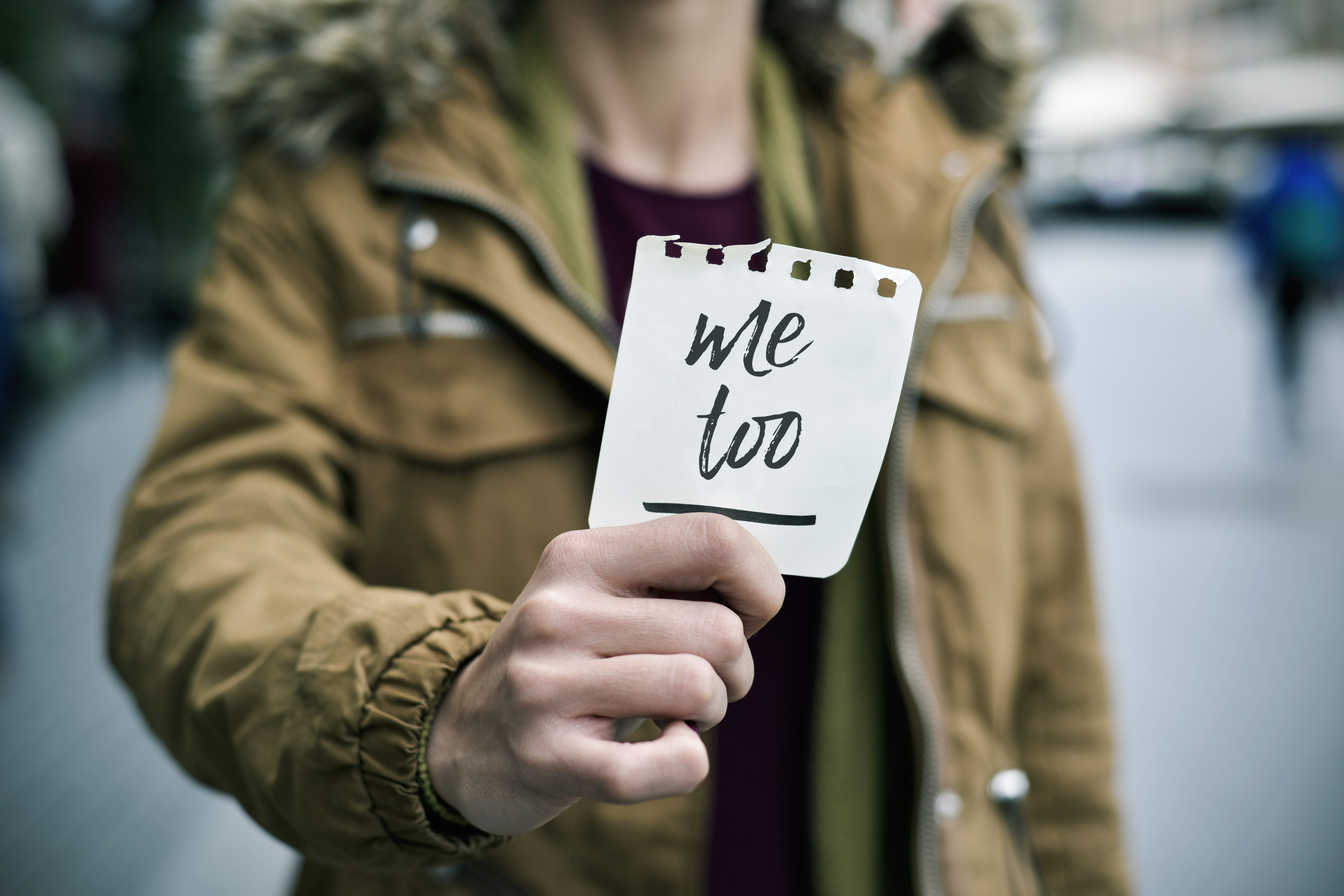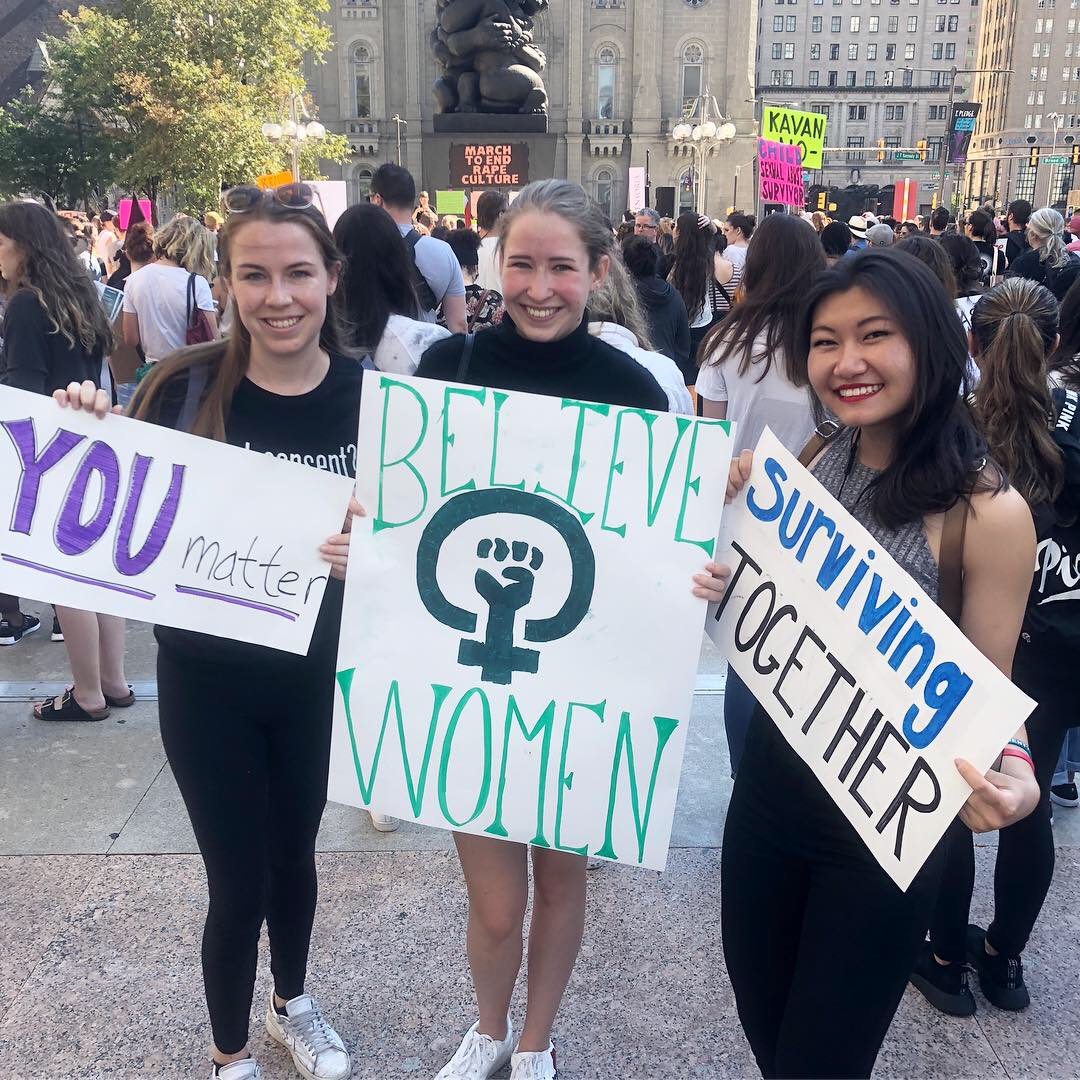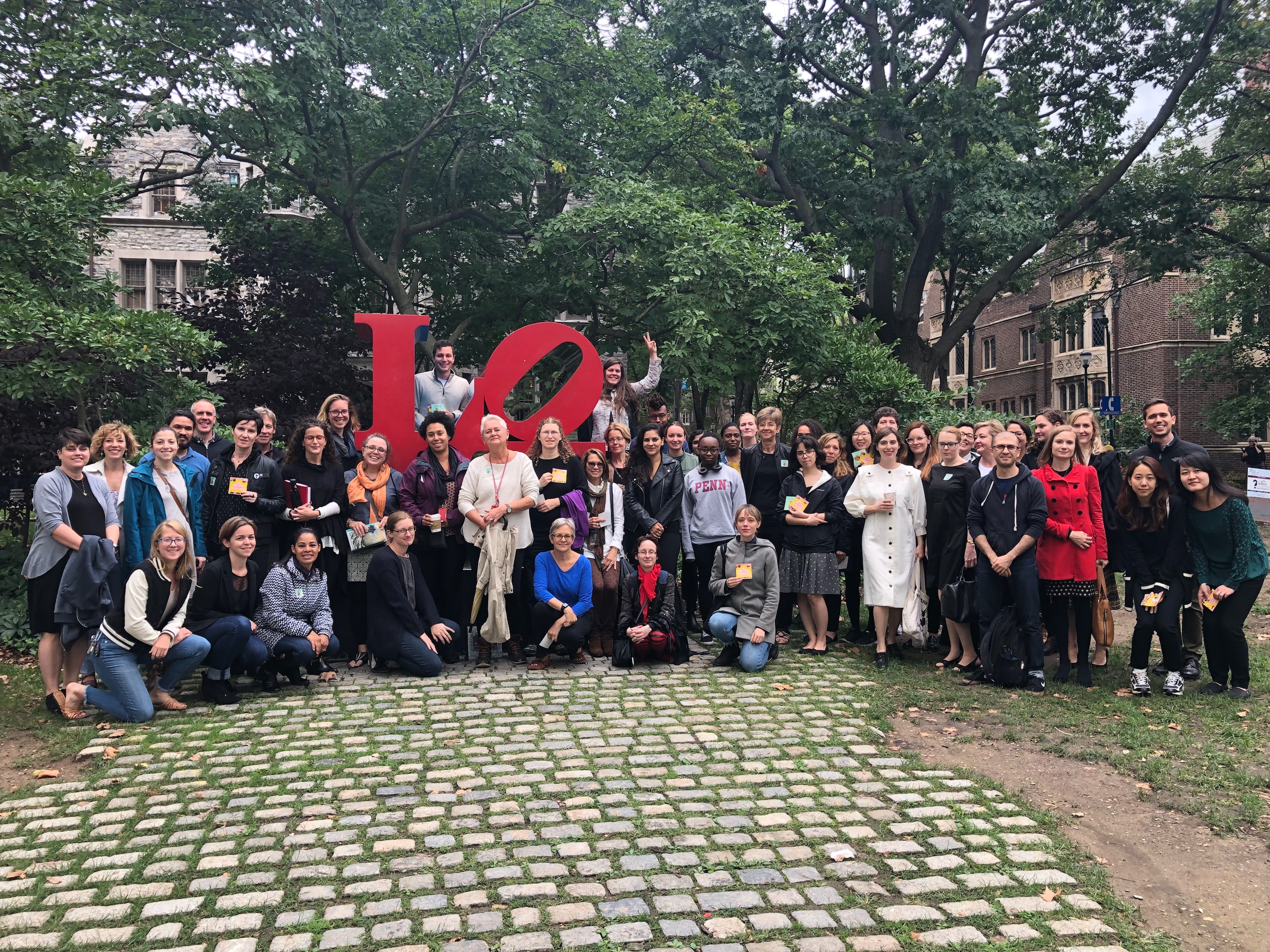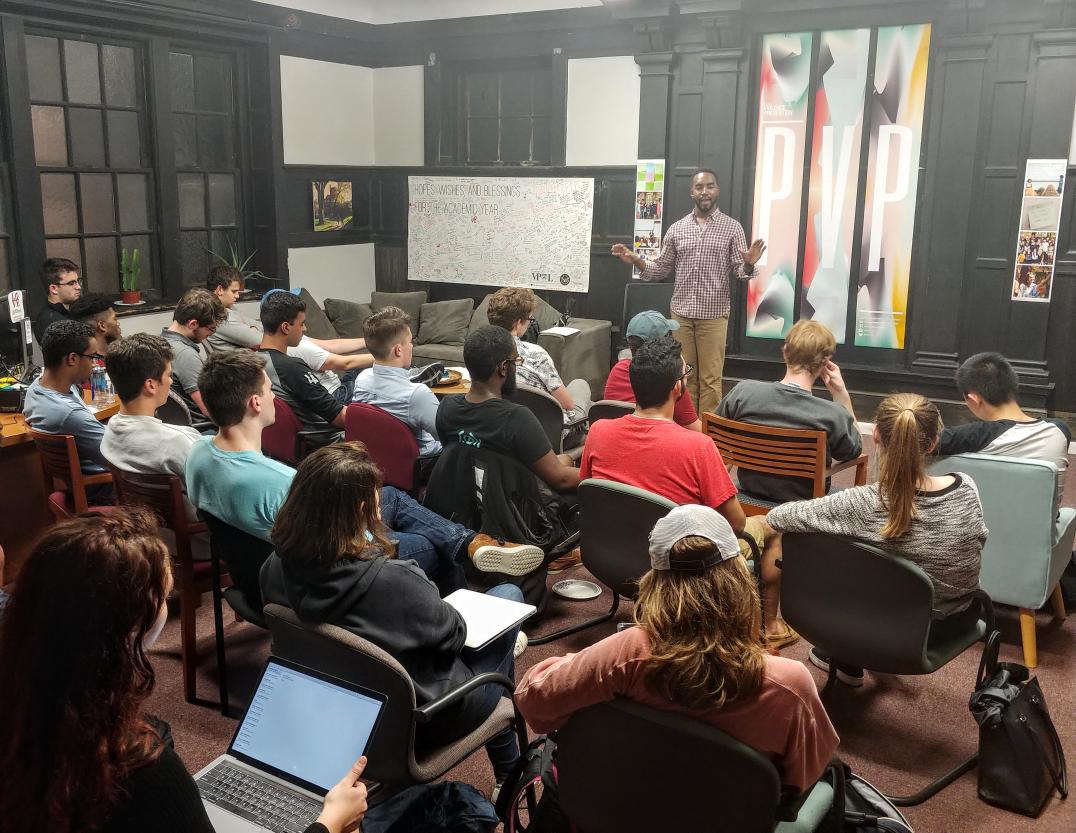
Feeling raw and emotional, but also strong and empowered, dozens of Penn students—representing all different backgrounds—gathered one recent sunny, Saturday morning for Philadelphia’s annual March to End Rape Culture.
The night before, student organization Abuse and Sexual Assault Prevention (ASAP) hosted a poster-making session at Penn Violence Prevention. The day of, the group enjoyed bagels together, sponsored by Penn Democrats, outside the University’s Women’s Center.
As one, they walked east to City Hall, ready and willing to hear from a slew of inspirational speakers, before marching for an hour through Rittenhouse Square and down to the Gayborhood.
“As a group, we wanted to show that we believe Christine Blasey Ford, and we believe survivors and we support them,” says Kara Hardie, chair of ASAP. “We also wanted to show that rape culture just has to end. There is no space for it anymore.”
A telling part of the experience, Hardie notes, is the reaction from people who weren’t participating in the march—the folks casually shopping, walking their dogs, or driving to brunch, for instance—who’d cheer, clap, or honk in support.
“I think it’s easy with what’s happening in Washington to kind of feel like maybe our community is a little bit alone and a little bit isolated,” says Hardie, a senior health and societies major. “But participating in events like the March to End Rape Culture really illuminate that we’re not.”
This feeling of understanding, community, open dialogue and support surrounding those who have been affected by sexual assault or sexual harassment has grown significantly, especially since last October, when, after media mogul Harvey Weinstein was accused in several capacities of sexual misconduct, the #MeToo movement took off.
Exactly one year and at least—according to the Pew Research Center—19 million #MeToo tweets later, four women leaders at Penn talked with Penn Today about the impact of the ever-evolving movement and its future on campus and beyond.
Out in the open
It was Oct. 15, 2017, when actor Alyssa Milano, after reading about the Weinstein allegations, expressed the two seemingly simple but emotional words on her Twitter account. To showcase the magnitude of the problem, she wrote: “If you’ve been sexually harassed or assaulted write ‘me too’ as a reply to this tweet.”
In a matter of hours, she had thousands upon thousands of replies from people—and not just women—across the globe.
Deborah Harley, Penn’s Sexual Violence Investigative Officer, says she wasn’t the slightest bit surprised when she first heard the news.
“This has been going on forever and ever and ever,” says Harley, a former assistant district attorney who specialized in rape, child abuse, stalking, and domestic violence cases. “And finally—finally—people were talking about it.”
It was particularly interesting for Haley Pilgrim, a fourth-year sociology Ph.D. student at Penn, to see the number of people who were speaking up, sharing their stories. She distinctly remembers a shift amongst even her closest social group.
“We started infusing it into our daily conversations in a way that we were not talking about it before,” Pilgrim recalls. “Women started being very upfront about personal experiences, and unashamed. It really was giving the power back to the survivors.”
Helping survivors recognize they’re not alone has been a major aspect of the #MeToo movement so far, says Jessica Mertz, director for Penn Violence Prevention and interim director for the Penn Women’s Center. Research shows that, in general, survivors are more likely to talk about their experiences when someone else does.
“There’s something about the phenomenon of that, that has been super magnified this year,” Mertz says. “It’s the feeling like you’re going to be heard, validated, not dismissed, and knowing that you’re not going to be the only person in the room who has had that experience.”
#MeToo has also, notes Hardie, allowed many people to identify, or perhaps give a name to, certain experiences they’ve had.
“That can be really valuable because a lot of survivors don’t know how to address what they’ve been through,” she says. “And for some people that can be helpful, in recognizing this was a trauma experienced and it is legitimate, and from there they feel more comfortable getting help.”
Unifying survivors
On the flip side, Hardie says, she noticed that much of the #MeToo movement showcased stories of people in Hollywood—those with power, and with a platform for their voice.
“That is part of what helps get the message out,” she says, “but I think it’s important to keep in mind people who don’t have that kind of platform, and don’t have that kind of power and voice, and really think critically about what the #MeToo movement does and does not do, and who it does and does not give a voice do.”
At Penn, Hardie says that as leader of ASAP, she and her team have made conscious efforts to increase diversity and pay attention to what an intersectional issue #MeToo can be.
Harley notes it’s likely easier for a celebrity to bring forth such an issue, for they might have less to lose.
“If someone had a job and a family and made minimum wage, it would take a lot of courage to come forward,” Harley says. “I don’t think it’s come full circle just yet. I think a lot of people are still unwilling to come forward because they fear the consequences.”
Indeed, the phrase itself—“Me Too”—and the meaning behind it originated more than a decade ago by longtime activist Tarana Burke, but it didn’t gain significant momentum until Milano exposed it last year.
“My immediate reaction is how often we see that happen, where it’s a black person, often a black woman, who begins something, and it’s not until a white woman repeats it that it’s given voice,” says Pilgrim. “I think that’s one of the important things about allyship, always giving credit where it’s due and bringing those voices along with you.”
Solidarity, Pilgrim adds, between survivors and allies is also “so important in the success of this movement.”
Mertz notes the significance of Weinstein in the allegations, too, because of his visibility and his role.
“If celebrities had posted about someone in their personal lives assaulting them, and it wasn’t validated by dozens of other powerful women who shared a similar experience, no one would have payed attention,” Mertz suggests. “But Weinstein is a name.”
Mertz adds that it’s a good thing celebrities have been able to use their platform for the cause, but it certainly begs the question: “Why wasn’t anyone listening before?”
Changes on campus
“It’s On Us,” a national campaign launched in 2014 by Vice President Joe Biden, now a Penn Presidential Professor of Practice, addresses sexual violence and relationship violence on college campuses, an issue long overdue. Penn Violence Prevention even propelled its own “It’s On Us” campaign the following year, releasing a series of posters educating the community on how to be an active bystander.
“Obviously, college is a moment for a lot of students when they are building social networks and learning about intimate relationships, and having their first sexual experiences,” says Mertz. “This is the time when they learn to have a voice and to use it, and to hopefully feel empowered to speak up when they see or hear harmful behavior.”
In that vein, Pilgrim adds: “On a college campus, we are change makers. Educational institutions should be a place where we replicate the society that we want to see at large.”
In addition, in 2015 Penn administered a “Campus Climate Survey on Sexual Assault and Sexual Misconduct,” along with 26 other universities through the Association of American Universities, bringing to light its own incidence and prevalence of sexual assault and sexual misconduct.
Data from the report, says Hardie, was unfortunate, but enlightening.
“I think having conversations like this, first of all, brings awareness to the fact that it is an issue that is faced at Penn, which unfortunately is not something that everyone is aware of,” she says. “There are people who think it isn’t a problem here. I think that contributes to the culture that allows it to happen.”
The report also allowed for departments like Penn Violence Prevention to evolve and grow, and programs like the Anti-Violence Engagement (AVEN) Network to gain momentum. It’s also boosted the importance of other student groups aside from ASAP, including Penn V-Day, Penn Anti-Violence Educators (PAVE), and Men Against Rape & Sexual Assault (MARS).
With already five years of Penn making these issues a top priority, #MeToo specifically played a role, says Mertz, in getting more graduate students involved in the conversation.
“Leading up to this, there was a big, national conversation about sexual assault on college campuses that really centered around fraternities and alcohol, which our graduate students were like, ‘That doesn’t have anything to do with me,’” Mertz explains. “I think the broadening of the national conversation to look at sexual harassment and assault more in the realm of professional spaces, with layers of power and privilege, has really opened up the conversation for graduate and professional students, and has helped [Penn Violence Prevention] build a better relationship with them, and have a better understanding of what they need from the institution to be supported.”
Battling burnout
Another aspect of #MeToo that all four women have noticed throughout the year is that, with amplified stories surfacing about sexual harassment and sexual assault, especially in the media, there has been sometimes an overburden for students, faculty, and staff—especially those involved in activist work, who, more often than not, are survivors, or are closely connected to a survivor.
The constant news cycles this past year—embroiling Philadelphia legends, entire religious institutions, and men holding the highest levels of power in the nation—is enough to break down survivors, recapping their own traumatic experiences day in and day out.
“That has made it harder to create boundaries and to prioritize their own self-care around these issues,” Mertz says.
One tactic Mertz imposes on herself is to not listen, watch, or read any media related to #MeToo after work hours.
“We all have different boundaries of how much we can manage based on our own experiences, our own trauma, and listening to that inner voice,” she says. “I need to have a few hours a day where this is not what I’m talking about or else I will be useless to people.”
She adds that it is necessary people don’t pretend the reality isn’t there, but “unplugging” and finding ways to decompress now and then is imperative “if you want to be effective and present in anything that you do.”
Hardie says she often encourages fellow classmates to check in with themselves emotionally, and to be honest about where they’re at and what their capacity to soak in the news is. For instance, during the Brett Kavanaugh hearings, Hardie would only listen to clips of the process—she didn’t think she could handle watching it in full.
“For example, I listened to John Oliver,” she says. “He gave a great overview of what had happened mixed in with humor and that worked, personally, for me to be aware and learn about what is happening without getting overwhelmed.”
“I think that understanding different ways you can interact with what’s happening that is comfortable for you takes time to understand and is hard, but is really valuable,” Hardie adds.
Here to stay
Reflecting on the past decade she’s been at Penn, Mertz can’t help but recognize how much has changed—not just at the University, but across the country.
“This issue has evolved incredibly; Penn Violence Prevention as a department didn’t even exist 10 years ago,” she says. “This wasn’t a conversation people were having in the mainstream.”
She notes the impact of moving women and other marginalized communities into positions of power; they’ve been able to tell their stories, and to finally be heard.
It’s also new for Mertz to see incoming freshmen at Penn already exposed to the conversation.
“Their knowledge base around these issues is so different,” she says. “A lot of them are now coming from a high school where they’ve had very targeted programming, and they’re all on social media so they’ve been reading the same things we all have been.”
A fascinating journey, Mertz notes, it’s been remarkable “being alongside so many other people who have been fighting for this issue to get attention and to be valued for so long.”
The #MeToo movement itself has evolved, too, says Pilgrim.
“Its originators probably didn’t even realize all it would transform into,” she says. “It speaks to the amount of people who felt this empowered by sharing their stories and feeling this solidarity with other people screaming, ‘Me too.’”
For many, many years, it’s taken strong effort to just raise awareness of how big of an issue sexual harassment and sexual assault really is. Now that it’s been exposed, the next phase, says Mertz, is to make sure the proper tools are being given to people who want to respond to the issue, as well as building the infrastructure in spaces like colleges and workplaces to be supporting people—not silencing them or enabling the act.
As for the future of the #MeToo movement, Harley says that page has yet to be written, but she’s watching and waiting in support.
One thing she knows for sure: “The #MeToo movement is not going away.”
Photos provided by Penn Violence Prevention.










